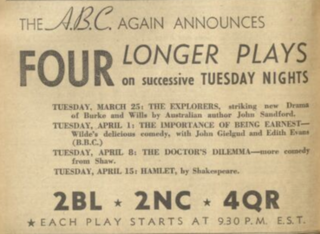Related Research Articles
Ronald Grant Taylor was an English-Australian actor best known as the abrasive General Henderson in the Gerry Anderson science fiction series UFO and for his lead role in Forty Thousand Horsemen (1940).

The Invisible Circus is a 1946 Australian stage play by Sumner Locke Elliott set in the world of commercial radio drama, a field that Elliott knew well from many years writing for George Edwards. Elliott is represented in two characters, the idealistic Brad and the more jaded Mark.
Daybreak is a 1938 Australian play by Catherine Shepherd.
Sons of the Morning is a 1945 verse drama Australian play by Catherine Duncan. It was originally written for radio.
Early in the Morning is a 1946 Australian radio feature by Ruth Park about Abel Tasman.

The Explorers is a 1952 Australian radio play about the Burke and Wills expedition by John Sandford. It was Sandford's first play.
Buke and Wills is a 1949 Australian radio play by Colin Thiele about the Burke and Wills expedition.
Krubi of Illawarra is an Australian radio verse play by Coral Lansbury. It was her first notable play and was written when she was nineteen.
Sky without Birds is a 1952 Australian stage play by Oriel Gray.

I'll Meet You in Botany Bay is a 1945 radio play by Ruth Park about Governor Arthur Phillip based on original documents and letters.
The Living Rock is a 1952 Australian radio play by Coral Lansbury. It was a modern-day Passion Play but "modern in style" according to Lansbury.
Jane, My Love is a 1951 stage play by Catherine Shepherd about Jane Franklin and John Franklin.
Spiegel the Cat is a 1952 Australian radio play by David Martin. It was adapted from Spiegel the Cat, a story from the Swiss writer Gottfried Keller.
A Dog's Life is a 1951 Australian radio drama by June Epstein. It was the story of a romance between a boy and his dog. The production was originally recorded in Adelaide.
What Happened to Leichhardt? is a 1948 Australian radio play by George Farwell about the disappearance of Ludwig Leichhardt.
The Bagman Stories is a series of Australian radio plays by Ruth Park and D'arcy Niland that originally aired between 1943 and 1948 on the ABC. They were narrated by swagman who tells stories he has collected during his time on the road. Each radio play went for 60 minutes included four mystery or ghost stories.
Far from the Land is a 1947 Australian radio play by Ruth Park. It was very well received on initial broadcast by the public.

Margaret Catchpole is a 1945 Australian radio drama by Rex Rienits about Margaret Catchpole. It was one of several dramatisations of Australian historical figures by Rienits.
Man of Two Tribes is a 1953 Australia radio serial based on the stories of Arthur Upfield about Detective Inspector Napoleon "Bony" Bonaparte. Morris West adapted several of Upfield's stories.
Hester's Diary is a `1947 Australian radio serial written by John Appleton set in colonial Australia.
References
- ↑ "Monday, January 26 Programmes", ABC Weekly, Sydney, vol. 10, no. 4, p. 7, 24 January 1948, retrieved 28 October 2023– via Trove
- ↑ "A.B.C. Features". Southern Cross . Vol. LX, no. 2996. 23 January 1948. p. 11. Retrieved 28 October 2023– via National Library of Australia.
- ↑ "Women's Interests On The Air She Educates The Parents". The Sydney Morning Herald . No. 36,046. 2 July 1953. p. 13. Retrieved 28 October 2023– via National Library of Australia.
- ↑ "Early Spring Fashions Previewed At District Model Quest". Illawarra Daily Mercury . 30 June 1953. p. 4. Retrieved 28 October 2023– via National Library of Australia.
- ↑ Rees, Leslie (1953). Towards an Australian Drama. Sydney: Angus and Robertson. p. 125.
- ↑ "The Week in Wireless". The Age . No. 28944. 31 January 1948. p. 7. Retrieved 28 October 2023– via National Library of Australia.
- ↑ "Around the Dial". The Daily Telegraph. Vol. XVIII, no. 95. 11 July 1953. p. 20. Retrieved 2 February 2024– via National Library of Australia.
- ↑ "Musical Serial Is A Hit". The Advertiser . Vol. 96, no. 29,561. Adelaide. 11 July 1953. p. 15. Retrieved 28 October 2023– via National Library of Australia.
- ↑ "Gad, sir, major Keen is a cad sir!". The Mail . Vol. 43, no. 2,144. Adelaide. 11 July 1953. p. 51. Retrieved 28 October 2023– via National Library of Australia.
- ↑ "Radio Plays for Next Week A.B.C.", ABC Weekly, 4 July 1953, retrieved 2 February 2024– via Trove
